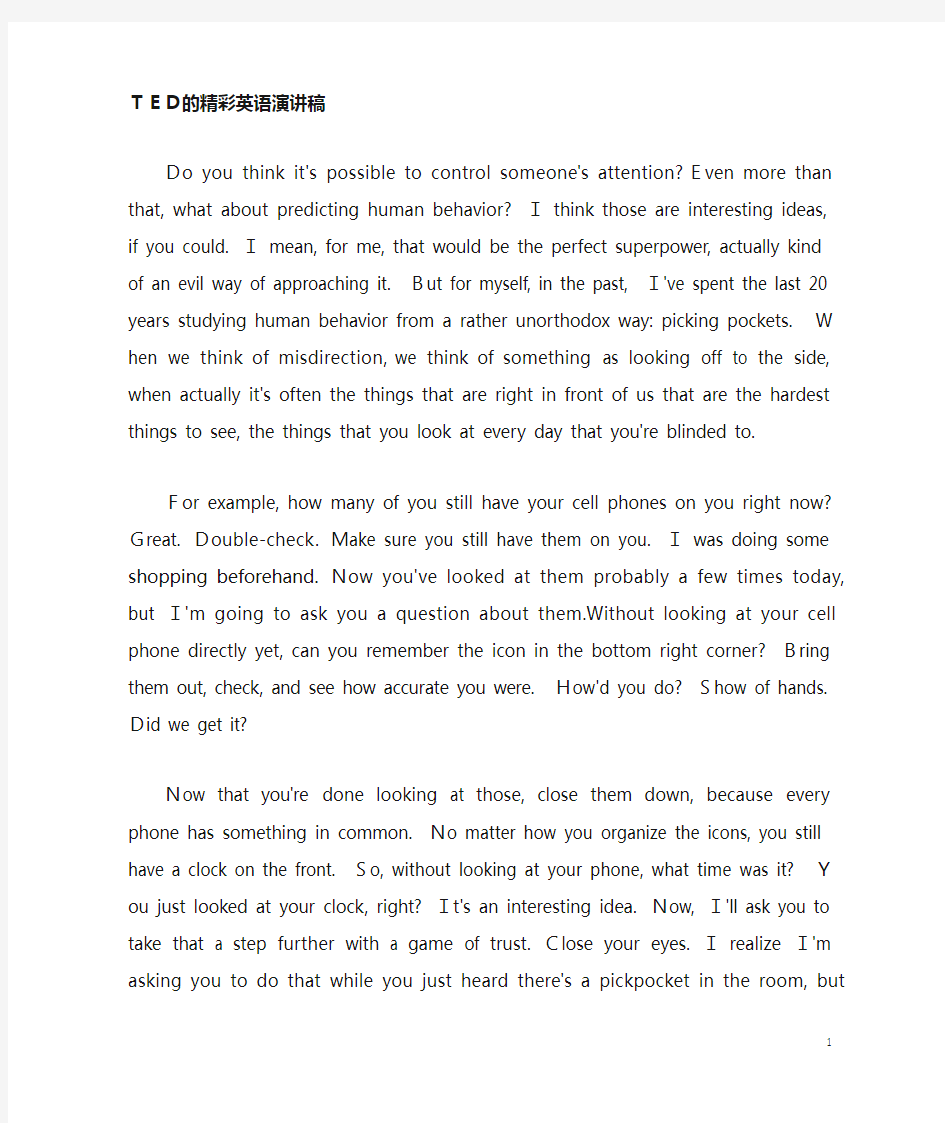
TED的精彩英语演讲稿
- 格式:docx
- 大小:16.87 KB
- 文档页数:4


TED的精彩英语演讲稿
Do you think it's possible to control someone's attention? Even more than that, what about predicting human behavior? Ithink those are interesting ideas, if you could. I mean, for me, that would be the perfect superpower, actually kind of an evil way of approaching it. But for myself, in the past, I've spent the last 20 years studying human behavior from a rather unorthodox way: picking pockets. When we think of misdirection, we think of something as looking off to the side, when actually it's often the things that are right in front of us that are the hardest things to see, the things that you look at every day that you're blinded to.
For example, how many of you still have your cell phones on you right now? Great. Double-check. Make sure you still have them on you. I was doing some shopping beforehand. Now you've looked at them probably a few times today, but I'm going to ask you a question about them. Without looking at your cell phone directly yet, can you remember the icon in the bottom right corner? Bring them out, check, and see how accurate you were. How'd you do? Show of hands. Did we get it?
Now that you're done looking at those, close them down, because every phone has something in common. No matter how you organize the icons, you still have a clock on the front. So, without looking at your phone, what time was it? You just looked at your clock, right? It's an interesting idea. Now, I'll ask you to take that a step further with a game of trust. Close your eyes. I realize I'm asking you to do that while you just heard there's a pickpocket in the room, but close your eyes.
Now, you've been watching me for about 30 seconds. With your eyes closed, what am I wearing? Make your best guess. What color is my shirt? What color is my tie? Now open your eyes. By a show of hands, were you right?
It's interesting, isn't it? Some of us are a little bit more perceptive than others. It seems that way. But I have a different theory about that, that model of attention. They have fancy models of attention, Posner's trinity model of attention. For me, I like to think of it very simple, like a surveillance system. It's kind of like you have all these fancy sensors, and inside your brain is a little security guard. For me, I like to call him Frank. So Frank is sitting at a desk. He's got all sorts of cool information in front of him,
high-tech equipment, he's got cameras, he's got a little phone that he can pick up, listen to the ears, all these senses, all these perceptions. But attention is what steers your perceptions, is what controls your reality. It's the gateway to the mind. If you don't attend to something, you can't be aware of it. But ironically, you can attend to something without being aware of it. That's why there's the cocktail effect: When you're in a party, you're having conversations with someone, and yet you can recognize your name and you didn't even realize you were listening to that.
Now, for my job, I have to play with techniques to exploit this, to play with your attention as a limited resource. So if I could control how you spend your attention, if Icould maybe steal your attention through a distraction. Now, instead of doing it like misdirection and throwing it off to the side, instead, what I choose to focus on is Frank, to be able to play with the Frank inside your head, your little security guard, and get you, instead of focusing on your external senses, just to go internal for a second. So if Iask you to access a memory, like, what is that? What just happened? Do you have a wallet? Do you have an American Express in your wallet? And when I do that, your Frank turns